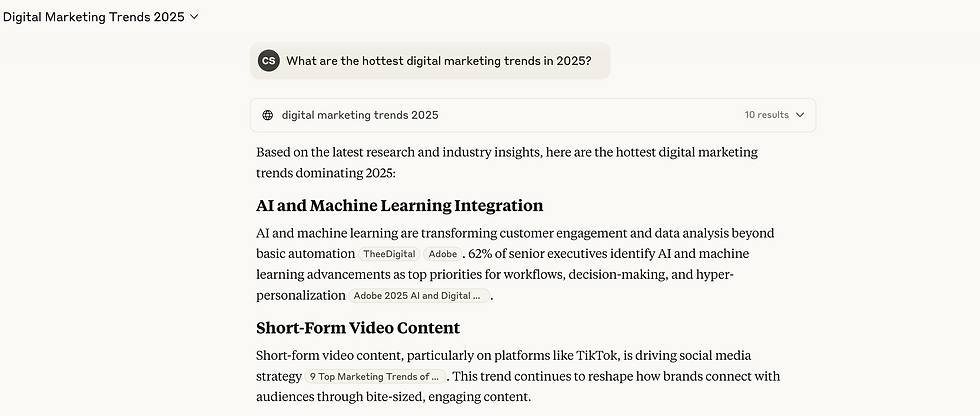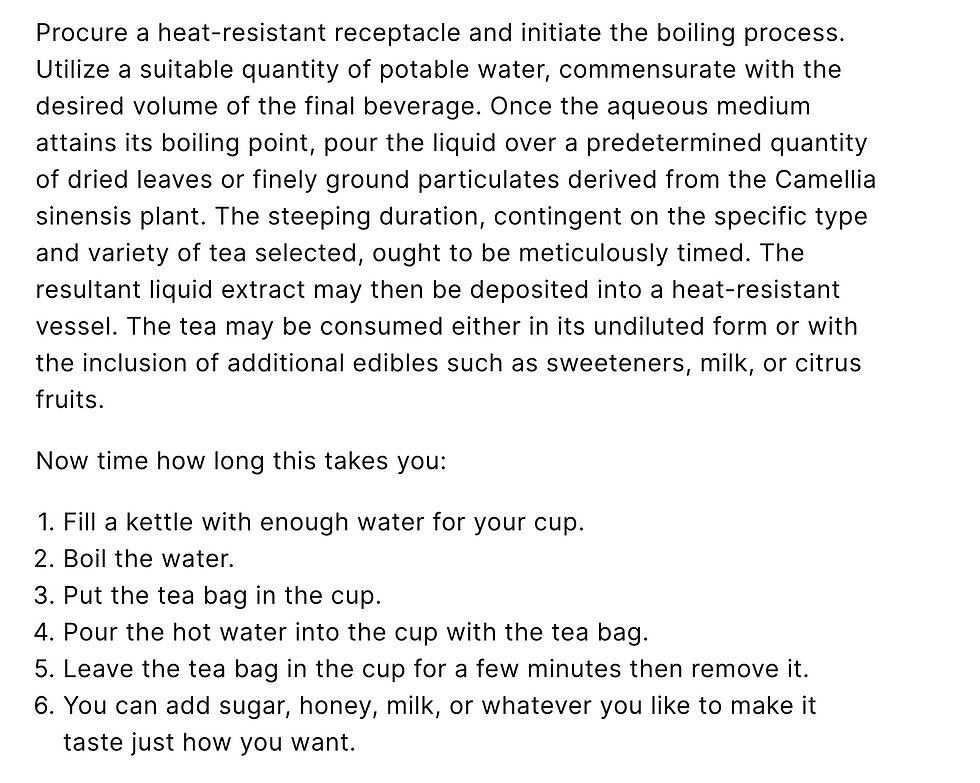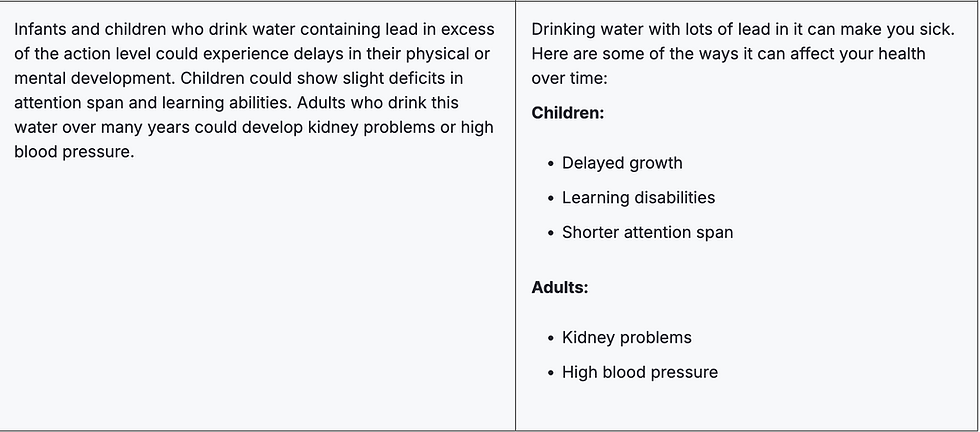How plain language can transform digital marketing performance
- Carol Saldanha
- Aug 8, 2025
- 5 min read
Updated: Dec 3, 2025

Zero-click search is when a user finds an answer directly in the search results without clicking a link. And they’re on the rise. A recent survey found that about 80% of consumers now rely on “zero-click” results in at least 40% of their searches. What do these numbers mean?
SEO is changing. And with it, the way we connect with customers online. To keep up, brands need more than keyword tricks. They need to speak clearly, directly, and sound human.
Enter the humble (yet mighty) plain language: a player that not only boosts zero-click search visibility but also:
builds trust
increases accessibility
drives conversion across every digital touchpoint.
What is plain language?
Plain language is when an audience can easily understand what is being communicated. It involves:
clear word choice
concise structure
a logical flow of ideas.
Plain language avoids jargon and cuts unnecessary words. It focuses on what the audience needs to know and what they can do with that information.
It’s not about “dumbing” things down. It’s about making information:
accessible
actionable
human.
How does zero-click search impact your business?

With consumers relying more on this type of search, we've finally put keyword stuffing and marketing speak to rest. We’re now entering an era of authentic customer language.
If you want to see your digital marketing strategy thrive, it must shift from “getting clicks” to “being the answer” that influences decisions. This is when using the language people actually speak saves the day.
How plain language can improve your digital marketing results
Drive conversion rates with clarity
Sometimes, the change is at the click of a button, literally. This was the case for Insound, an online music retailer (no longer in operation). When they updated their checkout design, conversions decreased. The culprit was the new language on the checkout button.
So they changed it from “Continue” to “Review Order”. That small change saw a 54% increase in funnel conversions.
Why did this work?
“Continue” is vague and doesn't tell customers what happens next.
“Review Order” is specific, clear, and reduces uncertainty.
Become the precise answer for AI Overviews
Google’s AI Overviews (AIO) now appear in almost half of searches. Here’s why plain language is your best ally:
About 88.1% of these are informational - the exact moment when customers form opinions about your brand. People need to understand who you are and what you do before they choose to click your link.
AI prioritises content that answers questions precisely - clear, relevant, and specific content is more likely to be surfaced and cited.
Plain language helps you write for intuitive questions, not keywords.
Solve problems and reduce customer service costs
When people find and understand the information they need, they can act independently.
The business impact is clear:
fewer questions about your features and policies
less time explaining your product or service
lower customer service cost per user.
One of our clients was on a mission to reduce client support calls. It was an ambitious project divided into three phases:
Phase one - to improve accessibility to solutions for everyday problems.
Phase two - to empower the customer through solutions-focused support.
Phase three - a long-term goal to proactively educate customers.
Part of our work involved rewriting their help and support content to meet that goal. We adjusted the tone of voice and adopted a plain language approach.
The results were impressive! After completion of phase two, the annual number of help calls dropped from 396,861 to 188,300.
Create trust with clear content
Successful relationships are based on trust. Good communication is the seed that grows trust. When you:
use the same language as your clients
understand their expectations
think about how your clients might be feeling and respond to this
You lead a relationship with understanding, making your clients feel heard and understood. The result? A happy and highly likely returning customer.
kill engagement
break down trust
make clients suspicious that you're not being transparent with them.
Repeat this like a mantra: clear communication builds stronger relationships.
Become inclusive and accessible to grow your client base
In Australia:
about 44% of adults read at literacy level 1 to 2 (a low level)
5.5 million people (21.4%) have a disability
5.6 million people (22%) reported using a language other than English at home.
Plain language makes your content accessible to more people. If you don’t use clear language, you risk cutting out potential customers, because:
cognitive abilities like processing speed, working memory, and executive function naturally decline as we age. This slows down the process of understanding and acting on information.
a complex text can be more challenging for people with low vision, ADHD, dyslexia, other disabilities and lower literacy levels.
This hits especially hard when you're dealing with critical services like:
health information
education
banking.
Importantly, no matter how high your literacy level is, easy, plain information is always easier to understand. Have a look at this example:

You might know every word in the top text, but how long did it take for you to read it? Then to realise it was instructions to brew a simple cup of tea? What about the bottom text?
Everyone deserves to understand information, regardless of their:
literacy level
age
country of origin
walk of life.
Plain language expert Deborah S. Bosley puts it perfectly: “people have a right to understand information that affects their life”.
Writing in plain language cheat sheet
Hopefully, we’ve convinced you that plain language is the way to go! Here are our 5 tips to consider.
The inverted pyramid structure
Using the inverted pyramid helps you organise information from the most important to the least important details.

Split your content into chunks
Help people scan your content quickly and find the information they need.

Write short sentences
Break down your long sentences into shorter ones. Short sentences are:
easier to scan
read
understand.
Before | After |
At Gilford Foundation, as a matter of principle, we invite our community to enjoy our gardens, our pathways, our aesthetically beautiful living environment and we are in the process, through our campus Masterplan, of redesigning both our built and our natural environment so all areas – lounges, meeting rooms, libraries, IT centres, corridors, and common areas – contribute to members finding their place. | At Guilford Foundation, we follow a principle: to invite the community to enjoy our:
We’re currently redesigning our campus masterplan. This process covers both our built and natural environments. All areas should help members find their place. This includes:
|
Use active voice
Writing in an active voice makes your sentences clearer, shorter and more conversational.
Passive voice | Active voice |
The work was completed by Kate. The project was prepared by the fundraising team. The grass in the courtyard should be avoided when wet. | Kate completed the work. The fundraising team prepared the project. Please don’t walk in the courtyard grass when it is wet. |
Use everyday words
As tempting as it is to impress people with your knowledge, remember the goal: helping people (and AI) understand who you are.
Swap | For |
utilise | use |
disclose | show, tell |
facilitate | help |
commence | start, begin |
purchase | buy |
inquire | ask |
Communicating in plain language meets your clients where they are. It makes your brand more relatable and drives results. It’s powerful, no matter if you’re:
chasing a better SEO ranking
trying to appear in zero-click searches
looking for stronger engagement
writing more accessible content.
Want to make your content more accessible and effective? Let’s chat about transforming your digital performance with plain language.
Image credits: Illustration by pch.vector on Freepik. Custom GIF by Dr Roots on Giphy.


